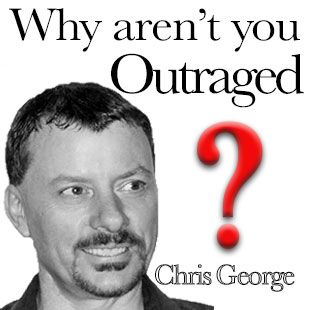
Image Credit: SUBMITTED/Chris George
September 25, 2018 - 12:00 PM
OPINION
As citizens, we expect a lot from our governments.
We expect them to provide wise guidance for our economy, prudent shepherding of our environment, and protection from violence both foreign and domestic. Quite often though these expectations can simply not be met due to conflicting priorities.
Economic growth is the mantra of economists and politicians and that growth must come at all costs, no matter which party is in power or what was promised during the most recent election campaign. The environment will pretty much always take a back seat to the economy and we are all pretty used to that.
Much less common is when economic imperatives clash with the military-industrial apparatus.
A couple of generations ago, the U.S. government changed how it recruits people to man the garrisons of the empire. Learning from the social impact that conscription had on its ability to operate, they switched from using implicit violence as their primary recruiting tool to the violence of poverty. In short, they stopped threatening to put people in jail if they didn't comply with conscription to threatening them with poverty. This had the added benefit of ensuring that the sons and daughters of those parents who had money would never have to serve unless they chose to.
This arrangement was always unspoken, at least until now. This week the U.S. Army publicly lamented that the strong economy and low unemployment has impacted their ability to meet their recruitment targets.
So here is a great example of the conflicting priorities of government. Should we expect the economy to trump protection from violence in this case? We know the economy takes precedence over the environment in pretty much every case but we don't really have many examples of economic health conflicting with the health of the largest military on the planet. And the U.S. is not alone in facing the ability to recruit in sufficient numbers. In the case of Japan, for example, it is demographics working with a robust economy that is seeing their ability to man their defence force falter.
Numbers are down in Canada as well. It is difficult to say exactly what part the economy plays here in meeting recruitment targets. All we can say for sure is that those targets have not been met for several years now and despite a small improvement in last years numbers there remains a large hole in our armed forces that needs filling with qualified recruits. It has gotten to the point that the Canadian military is considering relaxing their citizenship requirements. They are also attempting to boost the number of reservists.
In the United States, the past forty-five years have seen a shift in the demographic make-up of their armed forces. The clear relationship between lower incomes and opportunities in the black community and the numbers of black recruits has created a race-based disparity. While blacks make up only 12 per cent of the population they make up 21 per cent of the personnel in the U.S. armed forces. This is clearly driven by economics as the numbers for Hispanics at 18 per cent of the population and 14 per cent of the armed forces reflect the difference between the economic outcomes of the two groups in that country.
The U.S. government is facing conflicting priorities. To meet their recruitment targets they will either have to increase the economic incentives available to people who join their military or they will have to stop doing such a great job at managing their economy. Many countries around the world have sidestepped this conflict in priorities by either sticking with conscription or pondering its return in the face of declining numbers of volunteers.
With an election looming next year in Canada, it will be interesting to see what the different parties will bring forward as part of their platforms to address our challenges in this country.
With a decade-low rate of unemployment here it will be difficult for us to meet our recruitment goals without more money being injected into the process. After all, I am pretty sure that no one here will advocate for measures to cool the economy and increase unemployment.
— Chris George believes one measure of a just society is found in how well it balances fiscally conservative economics with social responsibility and environmental soundness in all of its living arrangements.
We welcome your comments and opinions on our stories but play nice. We won't censor or delete comments unless they contain off-topic statements or links, unnecessary vulgarity, false facts, spam or obviously fake profiles. If you have any concerns about what you see in comments, email the editor.
News from © iNFOnews, 2018